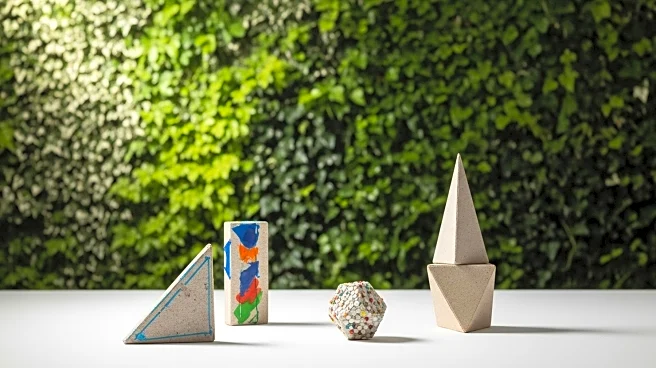What's Happening?
Andrea Zittel, an artist known for her innovative approach to art and life, has returned to the art world after a hiatus. Zittel is renowned for her A-Z West project in the Mojave Desert, which serves as a testing ground for new ways of living, featuring experimental sleeping pods and communal kitchens. Her work emphasizes sustainability and the integration of art into everyday life. After stepping back due to burnout and the unsustainable nature of her previous projects, Zittel has reemerged with a new set of rules guiding her art practice. These rules focus on creating work that emerges from everyday life, is efficient to produce, and requires minimal space for storage and transport. Her latest exhibition, 'Public Performance of the Self,' showcases this new approach, blending art with life in a more direct manner.
Why It's Important?
Zittel's return to the art world with a focus on sustainability and efficiency highlights a growing trend among artists to reconsider the environmental impact of their work. Her approach challenges the traditional art-making processes that often prioritize commercial success over ecological responsibility. By setting new rules for her practice, Zittel is advocating for a model that aligns artistic creation with sustainable living. This shift could influence other artists and institutions to adopt similar practices, potentially leading to a broader transformation in the art industry. Her work serves as a reminder of the importance of integrating sustainability into all aspects of life, including creative endeavors.
What's Next?
Zittel's new body of work is set to debut at Sprüth Magers in Berlin, marking her reentry into the public art conversation. As she continues to explore the intersection of art and life, her approach may inspire other artists to adopt sustainable practices. The art community may begin to see more exhibitions and projects that prioritize environmental responsibility. Additionally, Zittel's influence could extend beyond the art world, encouraging individuals and organizations to rethink their own practices in favor of sustainability. Her work may also spark discussions on the role of art in addressing global challenges such as climate change.
Beyond the Headlines
Zittel's emphasis on sustainability and efficiency in art-making raises important ethical questions about the role of artists in promoting environmental consciousness. Her approach challenges the conventional art market dynamics, which often prioritize profit over ecological impact. By integrating sustainability into her practice, Zittel is not only redefining her own work but also contributing to a larger cultural shift towards responsible consumption and production. Her work encourages a reevaluation of the values that drive artistic creation and the potential for art to serve as a catalyst for positive change.









